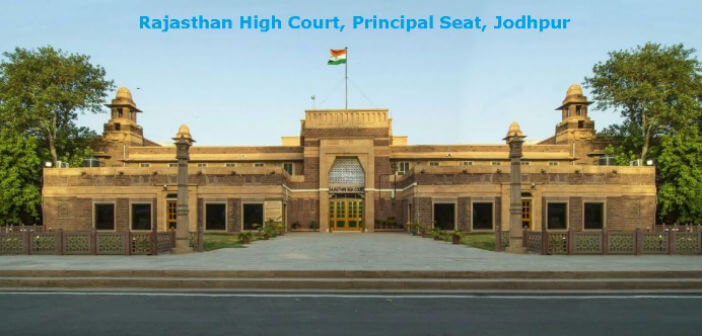In this edition of Court Judgements review, we look at the Supreme Court’s decision on Maternity Leave for third child, Madras High Court’s judgement on Government’s moral responsibility to cheated victims, and on Caste discrimination in appointing temple trustee, Rajasthan High Court’s judgment on denial of education to girls and Delhi High Court’s order on Maintenance.
Supreme Court: Maternity Leave is part of Reproductive Rights, which is an intersection of many international human rights including the right to health.
In K. Umadevi vs. Government of Tamil Nadu, the Supreme Court set aside the judgment of the Division Bench of the Madras High Court that held that the petitioner was not eligible for Maternity leave for her third child.
The brief facts of the case are as follows. The appellant, K. Umadevi, a government school teacher, sought maternity leave for her third child born from her second marriage. While her first two children (from a dissolved marriage, prior to her joining the service) were in her ex-husband’s custody, the state denied her request under Fundamental Rule (FR) 101(a), which restricts maternity leave to employees with less than two surviving children. The Tamil Nadu Chief Educational Officer rejected her application, arguing the rule barred benefits for a “third child” regardless of marital context.
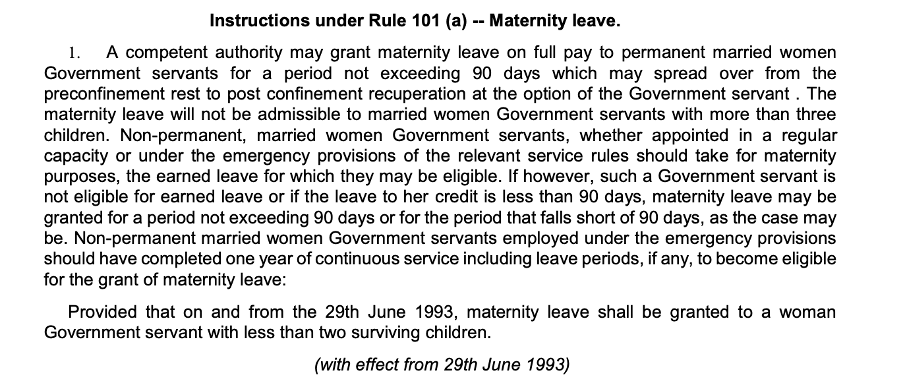
A Single Judge of the Madras High Court initially ruled in her favour, directing maternity leave sanction. However, a Division Bench reversed this, stating FR 101(a)’s two-child limit applied irrespective of custody or remarriage.
The counsel for the appellant argued that the Division Bench erred in its interpretation. They maintained that maternity leave is part of a woman’s reproductive rights under Article 21 of the Constitution, and that the logic of Deepika Singh vs. Central Administrative Tribunal (2023), which recognised the rights of women in non-traditional family structures, should apply. They also cited the Maternity Benefit Act, 1961 as persuasive, if not directly applicable, and emphasised that her first two children were not in her custody.
The Counsel for the state, in response, argued that the two-child policy was aligned with population control objectives and fiscal responsibility. They contended that the Deepika Singh case was distinguishable, as it involved twins from a single marriage. Extending benefits for remarriage would undermine small-family norms. The state also argued that the benefits for Tamil Nadu government employees were already more generous than those under the Maternity Benefit Act, and that the law clearly barred maternity leave for a third child, regardless of the family’s circumstances.
Hearing both parties, the Supreme Court observed that reproductive rights, including maternity benefits, are facets of the right to life/dignity. Depriving benefits based on remarriage stigmatises women and ignores evolving family structures. Further, Article 42 of the Directive principles mandates maternity relief, requiring liberal interpretation of service rules.
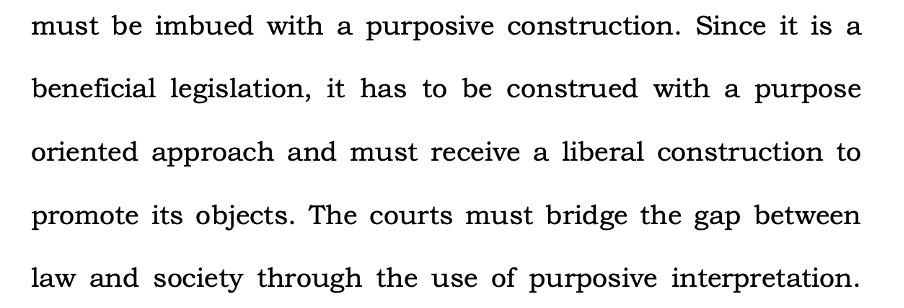
The court further criticised the state’s narrow reading of FR 101(a), noting that “surviving children” must account for custody and marital context. A child from a new marriage cannot be equated with prior children not in the mother’s care, and Deepika Singh precedent was affirmed, with the Court stressing that “atypical families” deserve equal protection under maternity policies. The Apex court further remarked that while population control is legitimate, it cannot override fundamental rights. The state’s fiscal concerns were deemed insufficient to justify denying constitutional safeguards.
Accordingly, the Apex Court set aside the Division Bench’s decision and directed the state to grant Umadevi maternity leave.
Madras HC: Government has the moral responsibility to ensure cheated victims are addressed and objectives under the TN Protection of Interests of Depositors Act, 1997
The Madras High Court, in A Paramasivam and Another vs. The Inspector of Police and Others, remarked that the government must establish effective mechanisms to ensure that cheated victims recover their money and that the objectives of the Tamil Nadu Protection of Interests of Depositors Act, 1997 are fulfilled.
The Madras High Court was hearing cases of cheating where the accused had collected deposits from a large number of persons to fund their business operations. The company offered that they would return the maturity amount with huge interest. But they have cheated the depositors. The petitions are filed seeking a direction to conclude the trial within a stipulated time limit.
Post hearing the submissions, the Court remarked that the Tamil Nadu Protection of Interests of Depositors (TNPID) Act, 1997 was enacted to protect ordinary people from fraudulent financial companies that promised high returns but failed to repay depositors, causing widespread hardship, especially among the poor and middle class. Despite the creation of the Economic Offences Wing in 2000 and the establishment of Special Courts to handle such cases, implementation has been slow and ineffective. Courts have repeatedly noted that most victims are vulnerable groups like senior citizens, widows, and pensioners, who are lured by false promises.
Judgments such as Thiru Muruga Finance and Others vs. State of Tamil Nadu and Mrs. S. Bagavathy vs. State of Tamil Nadu emphasised the need for quick recovery of depositors’ money and strict enforcement of the Act. The Supreme Court, in K.K. Baskaran vs State of Tamil Nadu, highlighted that traditional legal processes are too slow and costly for victims to recover their money, and stressed the importance of the Act’s special provisions for speedy relief.
However, in practice, victims rarely get their money back. Delays are common due to outdated procedures, lack of manpower, and slow action by authorities like District Revenue Officers, who are responsible for attaching and selling the assets of accused companies. Even after years, most cases remain unresolved and only a small fraction of lost deposits are recovered.
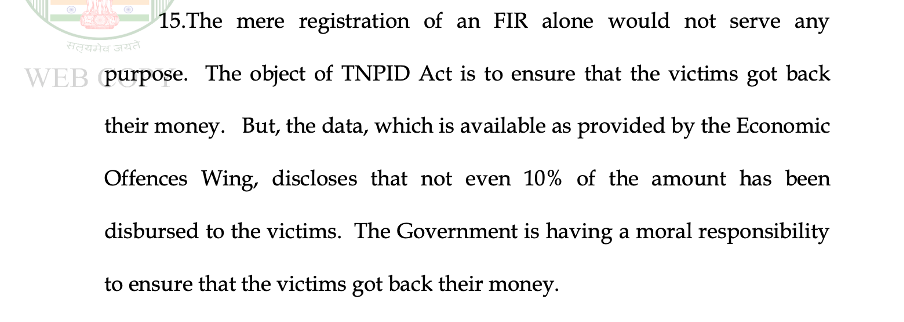
The Court remarked that the government has a moral duty to ensure that the Act achieves its purpose. This includes providing enough resources and modernising processes, such as using video conferencing to reduce unnecessary court appearances by investigating officers. The system must focus on helping victims recover their money quickly, rather than letting cases drag on for years without resolution. The court urged the government to address these issues urgently, so that the TNPID Act truly protects depositors as intended. Accordingly, the petitions are disposed of.
Madras HC: Before God, all persons are human beings and therefore, there cannot be any discrimination based on caste.
In K V Venugopal vs. Secretary to Government of TN, the Madras High Court rejected the plea of the petitioners asking for the appointment of a Temple Trustee from a particular caste. The court remarked that all persons are human beings before god and therefore cannot be discriminated.
A writ petition was filed under Article 226 of the Constitution of India seeking a Writ of Certiorarified Mandamus to quash the notification dated 03 April 2025 issued by the third respondent regarding the appointment of non-hereditary trustees for the fifth respondent temple, Arulmigu Karneeswarar Thirukoil, Chennai. The petitioner also requested a direction to the third respondent to issue an election notification so that trustees could be elected by members of the Sengunthar community who are permanent residents of Saidapet, Chennai.
The petitioner, claiming to be the secretary of a caste-based association, argued that only members of a particular caste (the Sengunthar community) should be eligible to become trustees and that the election should be conducted exclusively among them, rather than through government nomination or selection from the general public. The petitioner relied on an earlier scheme decree, which was later modified by the Commissioner, to support this claim. It was further contended that previous notifications, such as the one issued in 2022, had restricted applications for trusteeship to members of this specific caste, whereas the current notification had opened applications to the general public, prompting the present challenge.
The Court, however, referred to the philosophical views of Swami Vivekananda, who asserted that the soul transcends sex, caste, and imperfection, and Dr. B.R. Ambedkar, who maintained that caste is a mental construct without physical reality. The Court observed that, despite these progressive ideals, individuals like the petitioner continue to seek caste-based exclusivity in temple administration. In its detailed earlier judgment in A.Rajendran vs. The Joint Commissioner (W.P. No. 3838 of 2025), the Court had already held that caste does not constitute a religious denomination and that no caste can claim an exclusive right to manage a temple.
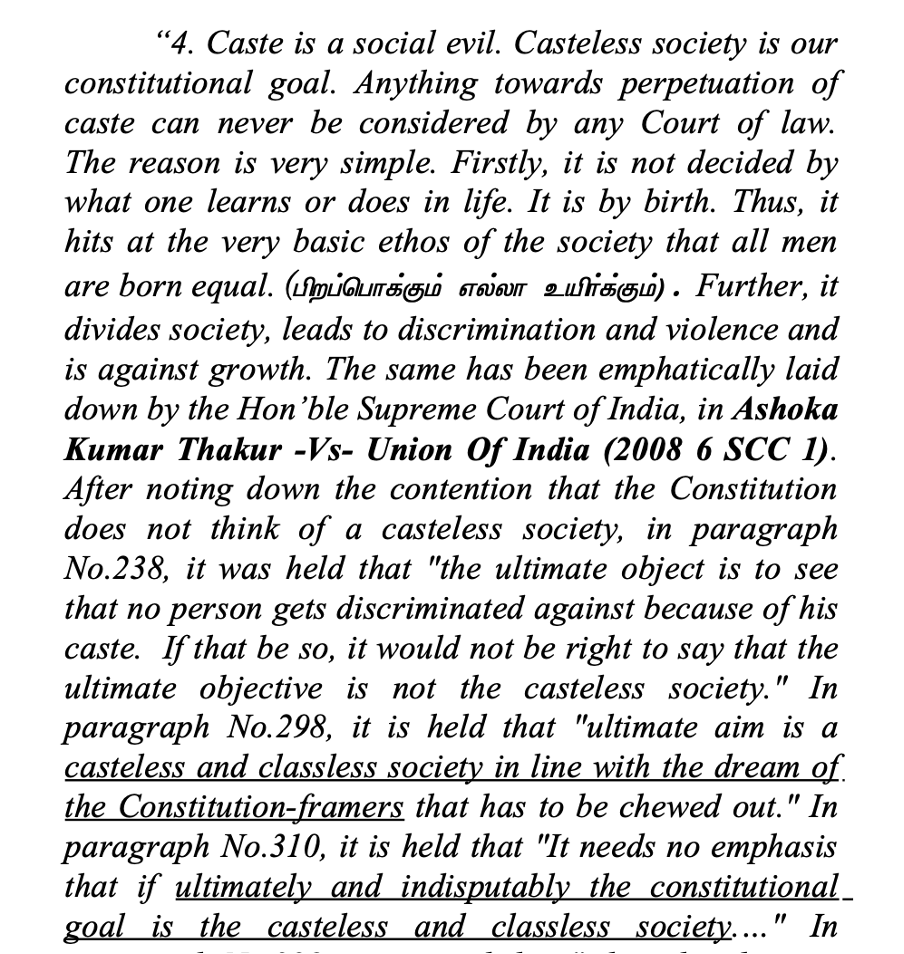
Further, the Court concluded that any scheme or decree that restricts temple administration based on caste is unconstitutional. The court held that all persons are human beings before god, and no discrimination is permissible. Accordingly, the writ petition is dismissed.
Rajasthan HC: Denying education on the basis of health concerns, arising due to menstruation, is unacceptable
The Rajasthan High Court, in Sakshi Choudhary vs. Union of India & Anr., held that denying education on the basis of health concerns, arising due to menstruation, is unacceptable. Every girl deserves equal education opportunities regardless of the health challenges she may face, and her menstrual cycle should not be treated as a barrier to the education of any girl child.
The Court was hearing a petition seeking direction against the respondents to admit her in the B.Sc. (Nursing) Course-2024 in any of the Colleges of Nursing under the Armed Forces Medical Services. The brief facts of the case are as follows: The petitioner approached the court seeking admission to the B.Sc. (Nursing) Course 2024 under the Armed Forces Medical Services, after being declared medically unfit due to low haemoglobin levels.
She had cleared the screening process, but during her initial medical examination by the Special Medical Board (SMB), her haemoglobin was found below the prescribed level, and she was declared unfit. Her appeal to the Appellate Medical Board (AMB) also resulted in the same conclusion. The petitioner claimed the low haemoglobin was due to heavy menstrual bleeding at the time of the test, a temporary condition.
Taking note of this, the Court passed an interim order on 07 October 2024 directing a provisional review medical examination. Following this, a Review Medical Board was constituted and found the petitioner medically fit for anaemia.
On 15 October 2024, the Court also directed the authorities to keep one seat vacant in the B.Sc. (Nursing) course. The seat remains vacant to date.
The respondents argued that 17 other candidates were also rejected for similar reasons and that there is no provision for a review medical board. They also contended that granting admission now could affect the course timeline and fairness to other candidates.
However, the Court held that anaemia caused by menstruation is a temporary condition and should not bar a candidate from accessing education.
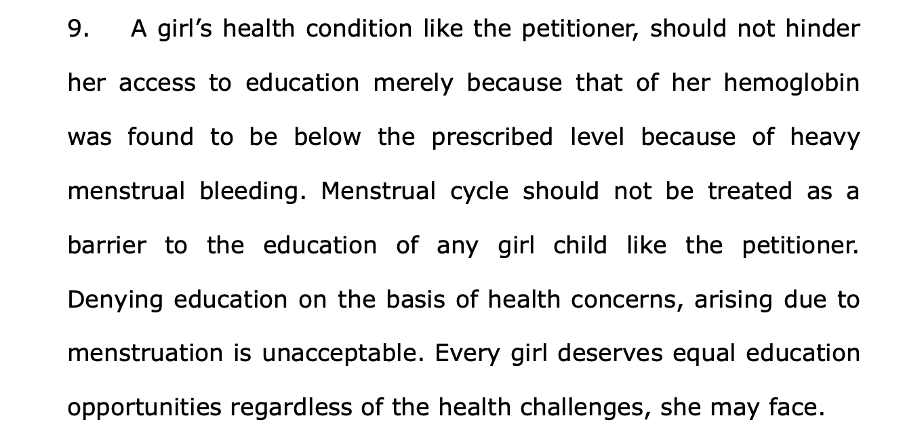
The petitioner actively pursued her case and was later found fit by the respondents’ own review board. The Court also noted that even other similarly placed candidates did not approach the Court; this cannot be held against the petitioner.
Accordingly, the respondents are directed to admit the petitioner in the B.Sc. (Nursing) Course, in any of the Nursing Colleges under the Armed Forces Medical Services. The petition stands disposed of.
Delhi HC: Maintenance is not a favour; it is a recognition of shared parental responsibility, and of the child‘s right to be supported
The Delhi High Court, in Sh. Vineet Gupta vs. Smt. Bhawna Gupta, held that maintenance is not meant to belittle the non-custodial parent, nor is it a measure of punishment. It is also not a favour, but a recognition of shared parental responsibility and the child’s right to be supported.
The brief facts of the case are as follows. This case revolves around a legal challenge by the petitioner-husband, Vineet Gupta, who contested an order directing him to pay interim maintenance of ₹50,000 per month for his two minor children. The marriage between the parties took place in July 2014, and they have two children born in 2015 and 2019. They separated in June 2021, and the wife, Bhawna Gupta, subsequently filed a complaint under Section 12 of the Protection of Women from Domestic Violence Act, 2005 (PWDV Act) in April 2022, along with a request for interim maintenance under Section 23.
The Magistrate, through an order dated 17 August 2023, denied maintenance to the wife but granted ₹50,000 per month for the two children. This decision was upheld by the Appellate Court on 25 November 2023. Dissatisfied with both rulings, the petitioner-husband approached the Delhi High Court.
The petitioner argued that the lower courts failed to appreciate that the respondent-wife is a government employee earning a substantial salary, approximately ₹87,500 per month, and that she also received significant sums through mutual fund transactions. He maintained that he was earning only ₹17,000 monthly as a mutual fund agent and had no income from his grocery store, which was reportedly running at a loss. He further contended that his own financial obligations—including EMIs, rent, and other expenses—were not adequately considered and that the responsibility of maintaining the children should be shared equally between both parents. In contrast, the respondent argued that she was solely responsible for the upbringing of their two minor children and accused the petitioner of concealing his real income and assets.
Upon hearing both parties, the court framed the issues for consideration:
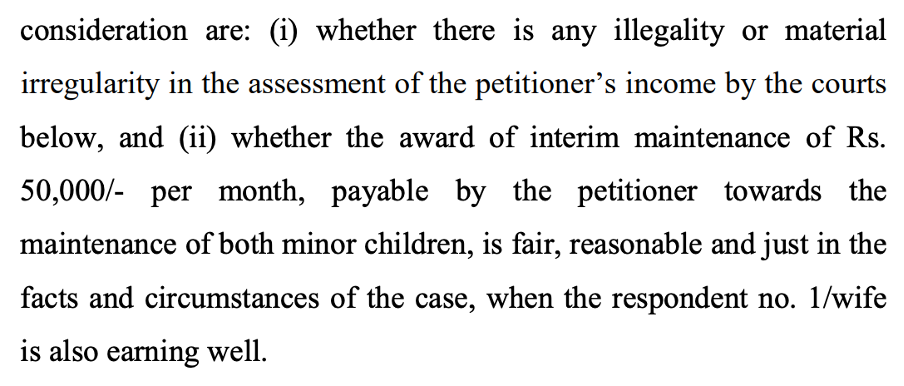
Considering the material evidence and facts of the case, the High Court observed that the petitioner’s claims were not substantiated by any credible documents and found multiple inconsistencies in his financial disclosures. The High Court also emphasised the non-financial contributions of the custodial parent, noting that Bhawna Gupta, while employed full-time, was also fulfilling all the emotional, educational, and physical needs of the children. The Court highlighted the importance of maintaining the children’s standard of living, particularly since they were enrolled in the same school they had attended before the separation.
Relying on Rajnesh vs. Neha, the Court reiterated that interim maintenance must be adequate, fair, and reflective of the lifestyle to which the children were accustomed. It acknowledged that the role of the custodial parent—whether mother or father—entails significant unquantifiable contributions, and therefore, maintenance should not be viewed solely through a financial lens.
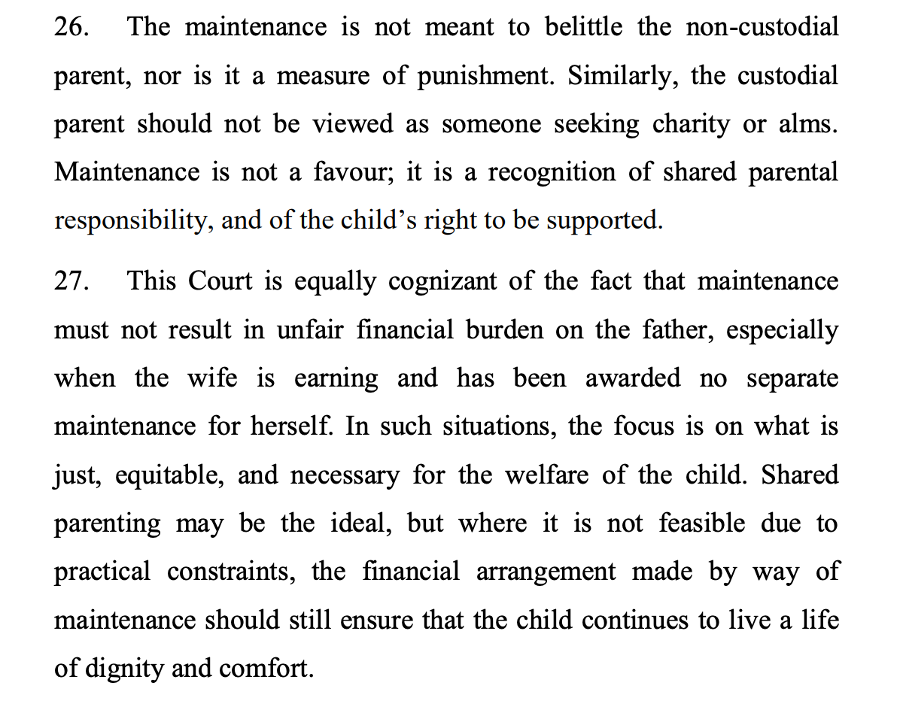
On the quantum of maintenance, the High Court observed that maintenance cannot be determined by applying rigid arithmetic standards, and it differs on a case-by-case basis. Considering both parties’ incomes, the Court found the ₹50,000 maintenance order to be reasonable and fair.
Accordingly, the petition is dismissed.


